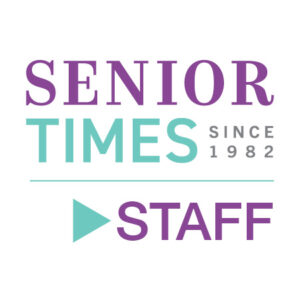
Home » Senior Times briefs — April 2025
Senior Times briefs — April 2025

March 31, 2025
Check out cherry blossoms in Prosser this April
As spring spreads in the Tri-Cities area, cherry trees burst into color.
The blossoms are expected to peak by April 15, according to a news release from Chukar Cherries. The Prosser-based business, which produces chocolate cherries, nuts and berries, put together a suggested driving tour to enjoy the Yakima Valley’s blooms.
The 20-minute driving route starts from Prosser and passes by the original Chukar orchard. The map can be found at chukar.com/blossom-tour, and the webpage updates weekly on Mondays with the current blossom forecast.
Chukar Cherries also sells Cherry Blossom chocolates, a treat with dried tart cherries, dark chocolate and a pink, white chocolate shell. The business noted that these treats are available at Washington, D.C.’s Capitol gift shop during the National Cherry Blossom Festival.
Delta Dental partnership to provide hearing health care
Delta Dental of Washington is bringing its individual and family plan members access to hearing health care through a new partnership.
The business is working with Amplifon Hearing Health Care, allowing Delta Dental members free access to more than 7,000 hearing health care providers.
The program allows participants to enter a 60-day trial of hearing aids, and a one-year follow-up care program is provided to help transition participants into new hearing aids.
Participating members will also have access to a virtual hearing screening and on-demand virtual visits with Amplifon’s remote care team. Virtual screenings don’t take the place of a diagnostic exam by a licensed professional, but they can provide a quick baseline reading of hearing ability, according to a press release.
Go to: amplifonusa.com/lp/deltadentalwa.
Abadan donates to Meals on Wheels
Abadan has donated $13,000 to Mid-Columbia Meals on Wheels, a program of the nonprofit Senior Life Resources Northwest. The contribution helps support Meals on Wheels in providing nutritious meals to seniors throughout the region as food prices rise.
Last year, Meals on Wheels delivered 278,000 meals to seniors throughout Benton and Franklin counties.
New colorectal cancer cases still trending younger
Adults under age 50 are part of a large wave of cases of colorectal cancer, which is on track to becoming the leading cause of cancer deaths for this age group by 2030, according to the University of Washington School of Medicine.
A full explanation for the increased incidence eludes experts, but a westernized diet appears to be an influential factor, said Dr. Rachel Issaka, a UW Medicine digestive system specialist and an associate professor of medicine, Division of Gastroenterology, at UW Medicine.
“Over the past three decades, colorectal cancer cases have doubled in people under age 50,” said Issaka, who also directs the Fred Hutch/UW Medicine Population Health Colorectal Cancer Screening Program.
Early detection is key, with recommended colon cancer screenings beginning at age 45, and even earlier for those with a family history of colorectal cancer or colon polyps, said Dr. David Hockenbery, a UW Medicine gastroenterologist and Fred Hutch Cancer Center researcher.
Study: New tech to manage type 1 diabetes is effective for seniors
Research from Washington State University, in collaboration with five other institutions, suggests that automated insulin delivery, or AID, systems are safe and effective for use by older adults with type 1 diabetes.
AID systems use a sensor attached to the arm or belly to continuously monitor blood sugar levels. The data is communicated to a wearable insulin pump, which automatically adjusts insulin dosing. Some models provide real-time data to smartphones.
WSU’s findings counter common assumptions that older adults would struggle with the advanced technology involved.
This study is the largest clinical trial to enroll older adults with type 1 diabetes, a group which was underrepresented in previous trials for AID devices.
While automated systems required more initial technical support to train participants using the devices, questionnaires completed during the trial showed that participants were equally willing to embrace the automated devices and found them as easy to use as non-automated devices.
Participants with mild cognitive impairment were able to use the devices just as effectively as those without.
Pasco’s Taco Crawl is back
The Pasco Taco Crawl, which launched in 2015, begins April 18 and runs through May 3, giving participants 16 days to try tacos from 20 different taco restaurants.
Taco fans can buy their booklets identifying this year’s taco restaurants online for $35, with the price increasing to $40 on April 9. They also will be available at Cafe Con Arte (430 W. Columbia St., Pasco) from 11 a.m. to 6 p.m. April 18, and then at Imbibe (104 N. Fourth Ave., Pasco) throughout the event.
Proceeds from the event go toward The Boys & Girls Clubs of Benton and Franklin Counties.
Go to: pascotacocrawl.com.
Senior Times
KEYWORDS April 2025




